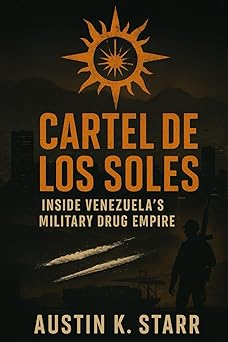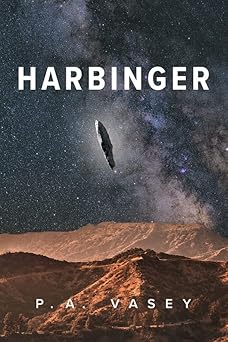
Austin K. Starr’s Cartel de los Soles: Inside Venezuela’s Military Drug Empire is a bold and gripping addition to the Cartels Chronicle series, offering readers a detailed examination of one of the most secretive and controversial drug trafficking operations in the world. Published in August 2025, the book investigates the rise of the so-called “Cartel of the Suns,” a term used to describe the alleged involvement of Venezuelan military officials in the cocaine trade. Starr approaches the subject with a balance of investigative detail, narrative drive, and contextual analysis, making this work both informative and highly engaging.
Content and Scope
The book delves into the origins of the Cartel de los Soles, tracing its evolution from scattered allegations to what many now consider a deeply entrenched criminal structure tied to elements of the Venezuelan armed forces. Starr describes how corruption, power struggles, and international alliances have shaped the cartel into something distinct from the drug organizations of Colombia or Mexico. Whereas the Mexican cartels often operate outside the state, Starr argues that the Cartel de los Soles represents a form of narco-statecraft, blurring the line between government and organized crime.
Readers are taken through the layers of Venezuela’s recent history—political turmoil, economic collapse, and authoritarian consolidation—and shown how these conditions provided fertile ground for military actors to take control of lucrative smuggling routes. Starr makes clear that this cartel is not simply about profit but also about maintaining political influence and survival within a collapsing system.
Writing Style
Starr’s style is investigative yet accessible. He avoids sensationalism, instead focusing on careful reporting, reconstructed accounts, and interviews that provide authenticity to his narrative. The book has the tone of a documentary thriller: factual, but with the pacing of a true-crime story. Complex geopolitical discussions are broken down in a way that readers unfamiliar with Venezuelan politics can still follow.
Themes and Analysis
One of the strongest aspects of this book is how Starr situates the Cartel de los Soles within the broader context of global drug trafficking. He draws connections between Venezuela’s military elites, Colombian cocaine producers, Mexican distribution cartels, and international markets in Europe and the United States. The book shows how Venezuela’s geography and political alliances made it a strategic hub in the cocaine supply chain.
Another key theme is the relationship between state power and criminal enterprise. Starr demonstrates how uniforms and official insignia, rather than protecting the public, became shields for smuggling operations. This inversion of authority is not only shocking but raises larger questions about governance, sovereignty, and the nature of modern organized crime.
Strengths
The greatest strength of Cartel de los Soles is its ability to take a complicated, shadowy subject and render it comprehensible without losing nuance. Starr carefully builds his case with layered details, weaving together testimonies, reported incidents, and geopolitical analysis. His portrait of Venezuela’s military establishment is neither caricature nor one-dimensional; he emphasizes that this is a system shaped by desperation, survival, and power struggles, not just greed.
The pacing also deserves mention. Each chapter unfolds with the intrigue of an investigative series, keeping the reader invested from start to finish. Starr balances heavy political analysis with human stories, which helps ground the narrative.
Weaknesses
Some readers may find the depth of political background slightly overwhelming, especially if they approach the book purely as a crime chronicle. The narrative sometimes shifts from the micro-level of trafficking routes to the macro-level of global diplomacy, which may challenge readers seeking a straightforward true-crime account. However, these sections ultimately add depth and context, even if they slow the pace.
Final Verdict
Cartel de los Soles: Inside Venezuela’s Military Drug Empire is a powerful and sobering look at how organized crime can intertwine with state institutions at the highest levels. Austin K. Starr has written not only a book about drugs and smuggling but also about the transformation of an entire country’s power structure. For readers interested in Latin American politics, global crime networks, or the evolution of modern cartels, this book provides a meticulously researched and gripping account.
It is both an exposé and a warning: when military authority merges with criminal enterprise, the results reshape nations and ripple across borders. Starr captures that reality in a way that is both chilling and essential.




